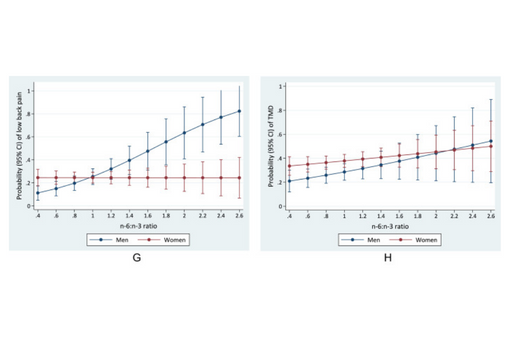Ratio of Omega-6/Omega-3 Polyunsaturated Fatty Acids Associated With Somatic and Depressive Symptoms in People With Painful Temporomandibular Disorder and Irritable Bowel
Abstract
Somatic symptom disturbance is among the strongest predictors of painful temporomandibular disorder (TMD). Related psychological constructs, such as anxiety and depression, respond therapeutically to omega-3 polyunsaturated fatty acids (PUFAs) in clinical trials. This cross-sectional study investigated associations between the omega-6/omega-3 PUFA ratio and somatic symptom disturbance and depressive symptoms in a community-based sample of 501 adults and determined whether these associations differed between adults with and without TMD or irritable bowel syndrome (IBS). Liquid chromatography tandem mass spectrometry quantified PUFAs in circulating erythrocytes. Somatic symptoms and depression were quantified using Symptom Checklist-90-Revised subscales. Presence or absence of TMD and IBS, respectively, were determined by clinical examination and Rome III screening questions. The standardized beta coefficient for the omega-6/omega-3 long-chain PUFA ratio was 0.26 (95% confidence limits (CL): 0.08, 0.43) in a multivariable linear regression model in which somatic symptom disturbance was the dependent variable. When modelling depressive symptoms as the dependent variable, the standardized beta coefficient was 0.17 (95% CL:0.01, 0.34). Both associations were stronger among TMD cases and IBS cases than among non-cases. Future randomized control trials that lower the omega-6/omega-3 PUFA ratio could consider somatic or depressive symptoms as a therapeutic target for TMD or IBS pain. PERSPECTIVE: In people with TMD or IBS, a high n-6/n-3 PUFA ratio was positively associated with somatic symptom disturbance and depressive symptoms. Both measures of psychological distress were elevated in people with painful TMD and IBS. Future randomized clinical trials will determine whether lowering the n-6/n-3 ratio is therapeutic for pain.
Keywords: Epidemiology; idiopathic pain; lipidomics; omega-6/omega-3 PUFA ratio; psychological distress.Citation
Sanders, A. E., Weatherspoon, E. D., Ehrmann, B. M., Soma, P. S., Shaikh, S. R., Preisser, J. S., Ohrbach, R., Fillingim, R. B., & Slade, G. D. (2022). Ratio of omega-6/omega-3 polyunsaturated fatty acids associated with somatic and depressive symptoms in people with painful temporomandibular disorder and irritable bowel syndrome. The Journal of Pain, 23(10), 1737–1748. https://doi.org/10.1016/j.jpain.2022.04.006


